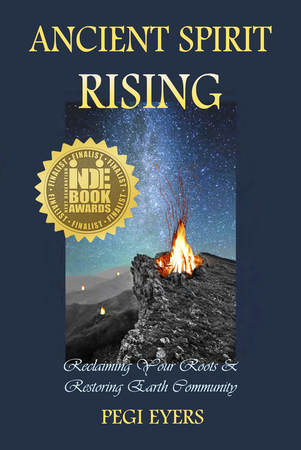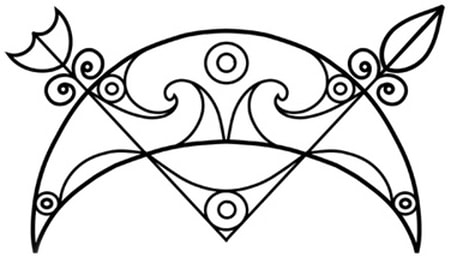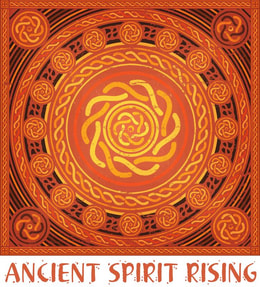"Everyone needs to get back to their
own Indigenous Knowledge."
Onaubinisay (Walks Above the Ground) / James Dumont
Anishnaabe Elder & Traditional Teacher
5th Degree - Three Fires Midewiwin Lodge
Anishnaabe Elder & Traditional Teacher
5th Degree - Three Fires Midewiwin Lodge
With his epic anti-appropriation statement “Everyone needs to get back to their own IK” James Dumont has given us a great blessing, by implying that IK is the collective birthright of all humanity, and that we all have original IK. Our challenge in this era of massive change is to integrate our own ancestral roots and wisdom with the psycho-geography of place, and to "re-land" ourselves in the landscapes we call home. We are living on Turtle Island, and isn't it time we started acting that way?
At the interface between First Nations and the Settler Society, Ancient Spirit Rising: Reclaiming Your Roots & Restoring Earth Community engages with themes of cultural appropriation, social justice, solidarity, allyship, re-centering Indigenous values, animism, rewilding, sacred sites, European Indigenous Knowledge (EIK), the Old Ways, cultural recovery, rejuvenating the ecocentric self, and our shift to localized community.
In terms of cultural appropriation, we need to ask why the modern non-native spiritual seeker who aspires to connect with nature, automatically uses sacred items and practices such as smudging, dreamcatchers, headdresses, bone chokers, the talking stick and the tipi. Who gave us permission to use these objects and symbols, and where are our own sacred expressions and tools as European people?
In Ancient Spirit Rising I suggest that a truly radical act in defiance to the hegemony that Empire has created, is to let go of our polyglot approach and focus on our own ancestral-sourced indigeneity. In the process of becoming the most dominant society on earth, as Eurocentric people we have traded away our place in the web of life, abandoned our eco-ethics, and surrendered our bond to the earth and the wholeness that it brings. The highest denunciation of patriarchal Empire and colonial values would be to recover a tribal worldview connected to the Earth, followed by developing a sense of the sacred specific to the roots of our ethnicity. As earth-connected peoples secure in our own Indigenous Knowledge (IK - or possibly said European Indigenous Knowledge ~ EIK) we could better contribute to the rebalancing of society, and the active shift in worldview that needs to happen for our species to survive.
PEGI EYERS
___________________________________________________
Notes
(1) James Dumont, “Introductory Remarks,” Elders and Traditional Peoples Gathering, Trent University, Peterborough, Ontario, February 12-14, 2010.
(2) The term “Indigenous” coupled with “Knowledge” and used as the acronym “IK” is in widespread and popular use among Turtle Island First Nation leaders, academics, authors, cultural creatives, activists, wisdom keepers and community people. “IK” has been found to be the perfect descriptor for a Turtle Island First Nations’ specific cosmology, worldview, spiritual traditions and lifeways, as in Anishnaabe IK, Haudenosaunee IK or Hopi IK. I use “Euro-Indigenous Knowledge” or “EIK” to describe the ancestral earth-connected cultures that originated in Old Europe. Please see Chapter 17, Page 155 “On the Use of the Term ‘Indigenous’ and Enlarging Settler Self-Indigenization” for the controversy regarding these terms, and clarification on my use of the terms “indigenous,” “IK,” “Euro-indigenous” and “EIK.”
At the interface between First Nations and the Settler Society, Ancient Spirit Rising: Reclaiming Your Roots & Restoring Earth Community engages with themes of cultural appropriation, social justice, solidarity, allyship, re-centering Indigenous values, animism, rewilding, sacred sites, European Indigenous Knowledge (EIK), the Old Ways, cultural recovery, rejuvenating the ecocentric self, and our shift to localized community.
In terms of cultural appropriation, we need to ask why the modern non-native spiritual seeker who aspires to connect with nature, automatically uses sacred items and practices such as smudging, dreamcatchers, headdresses, bone chokers, the talking stick and the tipi. Who gave us permission to use these objects and symbols, and where are our own sacred expressions and tools as European people?
In Ancient Spirit Rising I suggest that a truly radical act in defiance to the hegemony that Empire has created, is to let go of our polyglot approach and focus on our own ancestral-sourced indigeneity. In the process of becoming the most dominant society on earth, as Eurocentric people we have traded away our place in the web of life, abandoned our eco-ethics, and surrendered our bond to the earth and the wholeness that it brings. The highest denunciation of patriarchal Empire and colonial values would be to recover a tribal worldview connected to the Earth, followed by developing a sense of the sacred specific to the roots of our ethnicity. As earth-connected peoples secure in our own Indigenous Knowledge (IK - or possibly said European Indigenous Knowledge ~ EIK) we could better contribute to the rebalancing of society, and the active shift in worldview that needs to happen for our species to survive.
PEGI EYERS
___________________________________________________
Notes
(1) James Dumont, “Introductory Remarks,” Elders and Traditional Peoples Gathering, Trent University, Peterborough, Ontario, February 12-14, 2010.
(2) The term “Indigenous” coupled with “Knowledge” and used as the acronym “IK” is in widespread and popular use among Turtle Island First Nation leaders, academics, authors, cultural creatives, activists, wisdom keepers and community people. “IK” has been found to be the perfect descriptor for a Turtle Island First Nations’ specific cosmology, worldview, spiritual traditions and lifeways, as in Anishnaabe IK, Haudenosaunee IK or Hopi IK. I use “Euro-Indigenous Knowledge” or “EIK” to describe the ancestral earth-connected cultures that originated in Old Europe. Please see Chapter 17, Page 155 “On the Use of the Term ‘Indigenous’ and Enlarging Settler Self-Indigenization” for the controversy regarding these terms, and clarification on my use of the terms “indigenous,” “IK,” “Euro-indigenous” and “EIK.”




